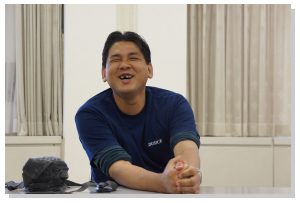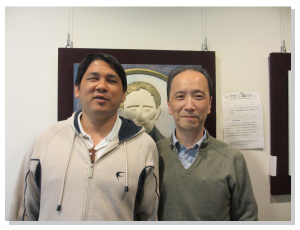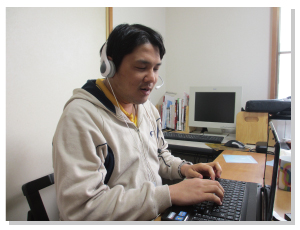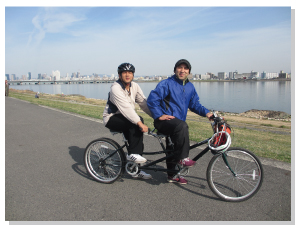- HOME
- Alumni News
- Yew Yi Lim (14th trainee)
- Yew Yi's Final Report
Yew Yi's Final Report
Samurai: Becoming Stronger Through Experience
1. Introduction
I am Lim Yew Yi from Malaysia. I am 29 years old. I am visually impaired and I worked at a center for blind people in Malaysia. Through many experiences during the 10 month long training in Japan, I acquired new knowledge.
The title of my report is ‘Samurai’. I have always liked Japanese anime, since childhood. In anime, samurais are portrayed as very strong and admirable people. This is why I chose the title.
2. My impression of Japan
If asked what Japan is like, I would immediately say that it is a country that is so safe, that one can go outside without locking the door. It is safe to go out at night, and there is no worry of having coins in your pocket stolen in streets. Japanese people are also very kind. In Japanese homes there are bathrooms with bathtubs, and people take off their shoes when entering someone’s house and change into slippers.
Japanese people are also very polite. For example, in the morning, Japanese people say “Ohayo Gozaimasu” (good morning) and bow. Japanese people are also very punctual and are never late for appointments.
Japanese people are also good at using chopsticks. Tap water in Japan is fit to drink and is also very tasty. In Malaysia, chopsticks are available only at Chinese restaurants and food stands. Tap water in Malaysia is also likely to give one a bad stomachache.
Japan also has many Braille blocks, which are very convenient for people with visual impairment. It is also possible to go anywhere in a wheelchair.
3. Experiences in Japan
(1) My most favorite food in Japan
Of all Japanese foods, I like tempura and miso soup more than anything else. I had miso soup every day. During the home-stay program, my host mother cooked me miso soup with ample amounts of vegetables, and it was very tasty. I also love Japanese ‘okonomiyaki’ (savory pancakes), ramen, a rice bowl with tempuras on top, fried chicken known as ‘karaage,’ fried rice, an egg and rice bowl, fried dumplings (‘gyoza’), meat buns (‘nikuman’), fried noodles, and octopus ball snacks known as ‘takoyaki.’ I also love Japanese tea.

(2) Japanese language training
The Japanese language was extremely important for my 10-month training. Our Japanese teachers taught us key vocabulary, phrases and grammar. I had no knowledge of Japanese, but I was aware of its importance, as Japanese was used everywhere: during the training, during communications with Japanese people, and in conversations with friends. For example, during my home-stay program, the host father and mother spoke Japanese because they were not fluent in English. While studying personal computers, all of the words on the personal computer were Japanese. I also spoke Japanese with my training instructors and the staff members of the Japanese Society for Rehabilitation of Persons with Disabilities. Whenever I encountered a word I did not understand, I asked everyone to replace the word with another, easier one.
(3) Punctuality
Japanese people are extremely punctual. If I were to make an appointment with a friend to meet at 10, I would always see them there at five minutes to 10. In Malaysia, I would have arrived at around 10:20! We the Duskin trainees had to study hard every day, so it was not good to be late. After practicing being punctual so many times, I have become used to being on time. In fact I was never late for an appointment, which was very useful during the training.
It is also important to be aware of time when taking a train. For example, during the home-stay program, my host father and mother would tell me, “Yew Yi, we will go to the shrine at 8:30 tomorrow morning.” But by 8:30 the next morning, we would be on the train already, heading for the shrine.
(4) Home-Stay Program
I had never experienced a home-stay program before coming to Japan. It was wonderful. During the program I grew so fond of Japanese tea. My host father brewed me Japanese tea in his tea room, which was very tasty. Together with my host father, mother and elder brother, I visited Shinto shrines, supermarkets and parks. It was so enjoyable. My host father, mother and brother were so kind, and put my mind at peace. As my Japanese was not proficient, they spoke to me slowly in Japanese by using simple words. The home-stay program took place in the New Year so it was so cold, almost freezing at night. Nevertheless, it was very enjoyable.
(5) Group Training: Learning from My Fellow Trainees
During the group training I had so many experiences. Until then, I had never studied with people with different types of disability. For example, I learned about wheelchairs from Bing Yu. I can now push wheelchairs very skillfully. From Ashfaag and Raymond, I learned sign language. The most important sign language word was ‘toilet.’ Even in strange places, I could ask them to lead me to the bathroom just using that sign. I also enjoyed taking a bath with other trainees, and having dinner with them. I will never forget cooking dinner together, when we were in Hyogo for one week.
(6) Individual Training
I went to many places for 5 months and studied a number of subjects. I went to Fukuoka Prefecture, Shizuoka Prefecture, Osaka Prefecture, Hyogo Prefecture and Kyoto Prefecture. I also visited multiple areas of Tokyo. I often went on a train by myself to go to my training destination. At the NPO Co. Rokuseikai Hamamatsu Workshop with the Disabled-WITH, I learned making a white cane. At the ATDO, I learned DAISY. In the AIZU, Fukuoka, I learned about various welfare services for people with visual impairment. I also studied personal computers. At the Japan Braille Library in Takadanobaba, Tokyo, I learned about Sapie’s homepage. In Osaka, I learned about guide dogs, and practiced walking with a guide dog.


4. Yew Yi Becomes Stronger
I became very strong in the nine months. For example, before coming to Japan, I used to have heart palpitations when speaking in front of a large group of people. Now I am ok with it, and I did not get nervous on June 15, when each of us, the trainees, delivered a presentation reporting our trainings.
In Malaysia, I used to eat every so often during the day. But in Japan, I only ate three times a day, and when I felt hungry, I had a plenty of water.
I also used to be bad tempered. But now, I can better control myself. When I was studying Japanese, it was not easy to learn fast. But my instructor did not get angry but instead said, “Yew Yi, if you take your time, you will learn.” Similarly, when I was making a white cane at the WITH, Ms. Shiba said to me, “No rush. Take your time.” As a result I managed to make a beautiful white cane. In Malaysia, I used to think that it was better to do everything quickly. But now I know that everything should be done with care, even if it takes time.
5. What I Would Like to Do Back Home
When I return to Malaysia, I will first go back to my job at the center for people with visual impairment. On weekends, I would like to teach computers on a volunteer basis to people with visual impairment. I will also send letters to various companies in Malaysia to invite them to visit our organization. If they visit us, I will explain to them how visually impaired people are studying, and how their use of computers will contribute to companies. In Malaysia, corporate people have no understanding of people with visual impairment. If they actually see people with visual impairment, they will have a better understanding.
Next, I would like to make 7 peers and create a sport center for people with visual impairment with them. Accessibility is important and will be taken into account, so that the center, initially for the visually impaired, will eventually be open to people with any kind of disabilities. The center will also provide computer and vocational trainings, and offer trainings for deaf-blind people.

Lastly, wishing to become a leader, I wish to learn much more about welfare for people with visual impairment. I would like to visit many countries and learn about welfare. I would also like to visit a number of companies to correct their wrong perception toward people with visual impairment.
6. Lastly
The Duskin leadership training is a fantastic program. I learned so much in Japan. I had many experiences and got so many ideas. Throughout the 10 months, Duskin always supported us. Thank you, to everyone at the Duskin AINOWA Foundation. I would also like to express my gratitude for my Japanese teachers, individual training instructors, and all the members of staff at the Japanese Society for Rehabilitation of Persons with Disabilities. Thank you so much.




